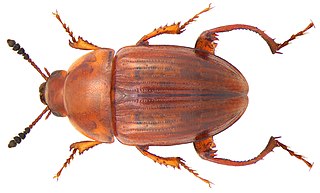
Beetles are insects that form the order Coleoptera, in the superorder Endopterygota. Their front pair of wings are hardened into wing-cases, elytra, distinguishing them from most other insects. The Coleoptera, with about 400,000 described species, is the largest of all orders, constituting almost 40% of described insects and 25% of all known animal life-forms; new species are discovered frequently, with estimates suggesting that there are between 0.9 and 2.1 million total species. Found in almost every habitat except the sea and the polar regions, they interact with their ecosystems in several ways: beetles often feed on plants and fungi, break down animal and plant debris, and eat other invertebrates. Some species are serious agricultural pests, such as the Colorado potato beetle, while others such as Coccinellidae eat aphids, scale insects, thrips, and other plant-sucking insects that damage crops.

Mealworms are the larval form of the yellow mealworm beetle, Tenebrio molitor, a species of darkling beetle. Like all holometabolic insects, they go through four life stages: egg, larva, pupa, and adult. Larvae typically measure about 2.5 centimetres (0.98 in) or more, whereas adults are generally between 1.25 to 1.8 centimetres in length.

Agathidium is a genus of beetles in the family Leiodidae.
Agathidium bushi is a species of round fungus beetle in the family Leiodidae. It is found in North America.
Autarcontes is a genus of beetles in the family Buprestidae, containing the following species:

Gelae is a genus of round fungus beetles belonging to the family Leiodidae. The beetles are found in different parts of Central and North America. They are small and rounded, feeding on slime moulds. They were originally placed in the genus Agathidium following the discovery of the first species, G. cognatum, in 1878. The taxonomic position was revised with description of new species in 2004 by American entomologists Kelly B. Miller and Quentin D. Wheeler. Upon creation of the new genus, the five new species are Gelae baen, G. belae, G. donut, G. fish, and G. rol.

Leiodinae is a subfamily of round fungus beetles in the family Leiodidae. There are more than 60 genera and 1,800 described species in Leiodinae.
Agathidium difforme is a species of round fungus beetle in the family Leiodidae. It is found in North America.
Agathidium oniscoides is a species of round fungus beetle in the family Leiodidae. It is found in North America.
Agathidium fawcettae is a species of round fungus beetle in the family Leiodidae. It is found in North America.
Agathidium depressum is a species of round fungus beetle in the family Leiodidae. It is found in North America. It feeds on Stemonitis fusca
Agathidium pulchrum is a species of round fungus beetle in the family Leiodidae. It is found in North America.
Agathidium repentinum is a species of round fungus beetle in the family Leiodidae. It is found in North America.
Agathidium rusticum is a species of round fungus beetle in the family Leiodidae. It is found in North America.
Agathidium mollinum is a species of round fungus beetle in the family Leiodidae. It is found in North America.
Agathidium akallebregma is a species of round fungus beetle in the family Leiodidae. It is found in North America. It is named from the Greek words akalles, meaning ‘‘ugly’’, and bregma, meaning ‘‘face’’, for the unusually shaped anterior portion of the head in this species. It has a mandibular horn, moderately elongate body shape, and strongly concave posterior portion of the mesosternum.

Agathidium atrum is a species of round fungus beetles in the family Leiodidae. It is black with the sides of the thorax, legs and antenna brown. It is found in Europe, Russia, Armenia, Azerbaijan, Georgia, Turkey and Iran.

Agathidium mandibulare is a species of round fungus beetle in the family Leiodidae.
Agathidium akrogeneios is a species of round fungus beetle in the family Leiodidae. It is found in North America. This species is similar to other A. dentigerum subgroup members that have a large, acute, falcate male metafemoral tooth, very narrow metasternum with the oblique metasternal carinae relatively prominent and meeting medially in a large, posteriorly directed triangular lobe, large male metasternal fovea, and reduced eyes.
Agathidium pulchellum is a species of round fungus beetle in the family Leiodidae. It feeds exclusively on a slime mold species associated with mid-decayed aspen, spruce and birch logs in boreal forests. It was first discovered in 1971 in Blåkölen in Norrbotten, Sweden.





